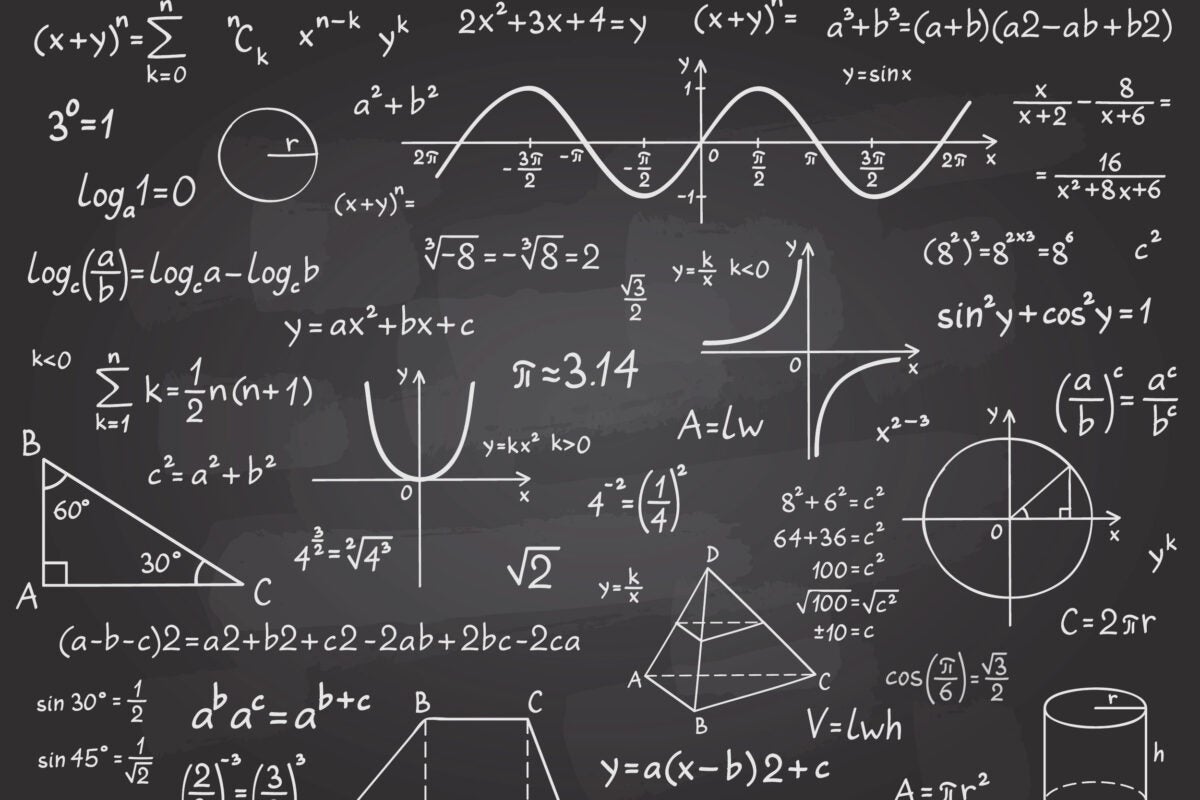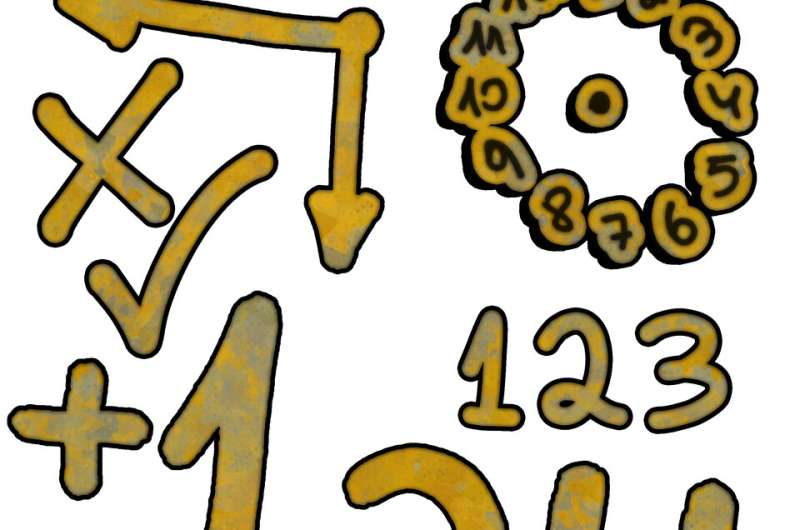“I’m finished,” one wrote. “Nobody else is. I must be wrong.”
Another wrote: “I’m not finished. Everybody else is. I must be wrong.”
Many remembered their parents saying something like, “Nobody in our family is good at math.” Others recalled the shame of standing at a blackboard, failing to solve an equation as their classmates heckled and laughed.
“Math anxiety is a serious handicap,” Tobias wrote in a 1976 article in Ms. magazine describing her findings. “It is handed down from mother to daughter with father’s amused indulgence. (‘Your mother never could balance a checkbook,’ he says fondly.)”
Today, math anxiety still smothers students — especially those who belong to groups historically underrepresented in the field — and there’s more at stake than a balanced checkbook. Threats like climate change, pandemics, and gerrymandering cannot be solved without math.
“You can’t begin to grasp those issues,” Tobias said in a talk at West Virginia University just one year before she died, in 2021, at the age of 86. (The death was not widely reported until a New York Times obituary appeared in September of this year.)
Almost 50 years have passed since Tobias, whose papers are held by Radcliffe’s Schlesinger Library, first described math anxiety’s impact on students — especially young girls and women. And yet, not much has changed. According to the cognitive scientist Sian Beilock’s 2019 Harvard Business Review article, “Americans Need to Get Over Their Fear of Math,” nearly half of first- and second-grade students say they are “moderately nervous” or “very, very nervous” about math, and a quarter of college students report moderate or high levels of math anxiety.
“Hating math seems to bring people together,” said Reshma Menon, a preceptor in Harvard’s mathematics department. “This isn’t just about my students. I’ll meet people at the grocery store or I’ll be in an Uber chatting with the driver. When I tell them I teach math, the immediate response is, ‘Oh my God, I used to hate math in school.’ Math anxiety is worldwide and very, very real.”
Math hatred, or what some call “math trauma,” is like the common cold: ubiquitous, tricky to trace, and hard to treat.
“There’s a genius myth in mathematics,” said Brendan Kelly, director of introductory math at Harvard. “There’s often this perception that success requires some natural ability, some unteachable qualities, some immutable traits.”
When students learn to write stories or play the violin, most don’t expect to replicate Toni Morrison or Niccolò Paganini in their first attempts. No one says, “I’m not a writing person.” But in math, said Allechar Serrano López, also a preceptor in mathematics at Harvard, “It gets decided when they’re literally children if they are going to be math people or if they’re not math people.” And because math is a gateway to almost every other field of science, that early stamp can squeeze students out of the STEM pipeline.
But the genius myth isn’t the only barrier.
Students come to college with vastly different educational backgrounds based on which elementary and secondary schools they attended. Some schools don’t even offer calculus, Menon noted. “During the pandemic, these differences became wider; the disparities are much more evident now than they were before,” she said.
Disparities across schools often disproportionately affect low-income students and students of color. “That divide creates lower confidence among students,” said Menon. “But there’s also the problem, generally, of women, students of color, and nonbinary students feeling like they don’t fit in.”

3rd Edition of International Conference on Mathematics and Optimization Methods
Website Link:https://maths-conferences.sciencefather.com/
Award Nomination: https://x-i.me/XU6E
Instagram: https://www.instagram.com/maths98574/
Twitter: https://twitter.com/AnisaAn63544725
Pinterest: https://in.pinterest.com/maxconference20022/
#maths #numericals #algebra #analysis #analysis #mathmatics #numericals #number #complex #graphics #graphs
Today, math anxiety still smothers students — especially those who belong to groups historically underrepresented in the field — and there’s more at stake than a balanced checkbook. Threats like climate change, pandemics, and gerrymandering cannot be solved without math.
“You can’t begin to grasp those issues,” Tobias said in a talk at West Virginia University just one year before she died, in 2021, at the age of 86. (The death was not widely reported until a New York Times obituary appeared in September of this year.)
Almost 50 years have passed since Tobias, whose papers are held by Radcliffe’s Schlesinger Library, first described math anxiety’s impact on students — especially young girls and women. And yet, not much has changed. According to the cognitive scientist Sian Beilock’s 2019 Harvard Business Review article, “Americans Need to Get Over Their Fear of Math,” nearly half of first- and second-grade students say they are “moderately nervous” or “very, very nervous” about math, and a quarter of college students report moderate or high levels of math anxiety.
“Hating math seems to bring people together,” said Reshma Menon, a preceptor in Harvard’s mathematics department. “This isn’t just about my students. I’ll meet people at the grocery store or I’ll be in an Uber chatting with the driver. When I tell them I teach math, the immediate response is, ‘Oh my God, I used to hate math in school.’ Math anxiety is worldwide and very, very real.”
Math hatred, or what some call “math trauma,” is like the common cold: ubiquitous, tricky to trace, and hard to treat.
“There’s a genius myth in mathematics,” said Brendan Kelly, director of introductory math at Harvard. “There’s often this perception that success requires some natural ability, some unteachable qualities, some immutable traits.”
When students learn to write stories or play the violin, most don’t expect to replicate Toni Morrison or Niccolò Paganini in their first attempts. No one says, “I’m not a writing person.” But in math, said Allechar Serrano López, also a preceptor in mathematics at Harvard, “It gets decided when they’re literally children if they are going to be math people or if they’re not math people.” And because math is a gateway to almost every other field of science, that early stamp can squeeze students out of the STEM pipeline.
But the genius myth isn’t the only barrier.
Students come to college with vastly different educational backgrounds based on which elementary and secondary schools they attended. Some schools don’t even offer calculus, Menon noted. “During the pandemic, these differences became wider; the disparities are much more evident now than they were before,” she said.
Disparities across schools often disproportionately affect low-income students and students of color. “That divide creates lower confidence among students,” said Menon. “But there’s also the problem, generally, of women, students of color, and nonbinary students feeling like they don’t fit in.”

3rd Edition of International Conference on Mathematics and Optimization Methods
Website Link:https://maths-conferences.sciencefather.com/
Award Nomination: https://x-i.me/XU6E
Instagram: https://www.instagram.com/maths98574/
Twitter: https://twitter.com/AnisaAn63544725
Pinterest: https://in.pinterest.com/maxconference20022/
#maths #numericals #algebra #analysis #analysis #mathmatics #numericals #number #complex #graphics #graphs

No comments:
Post a Comment